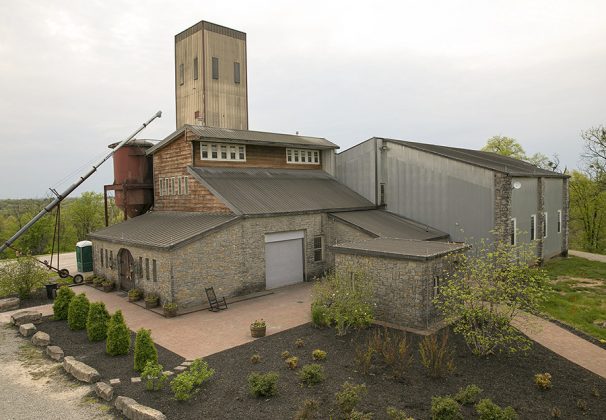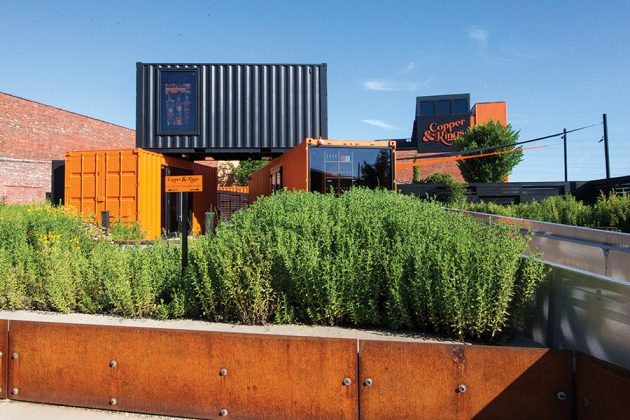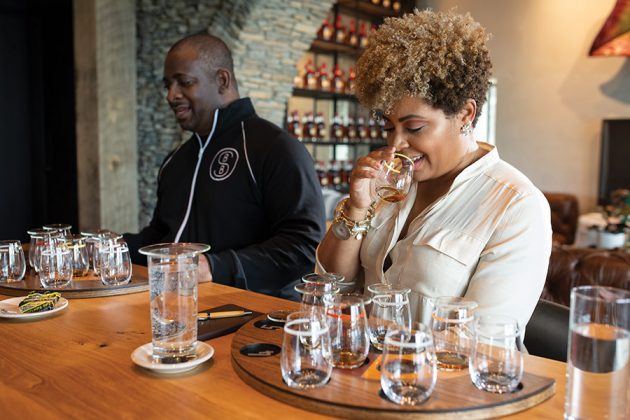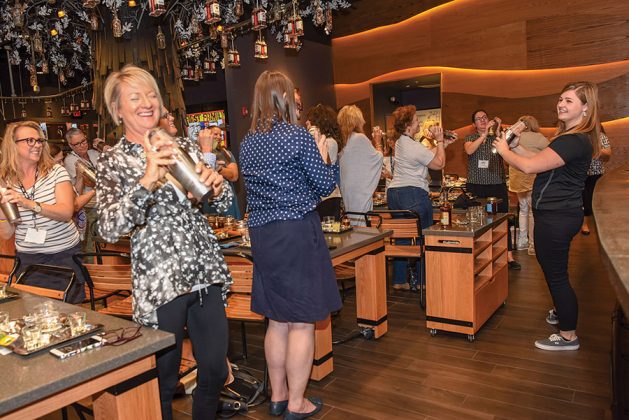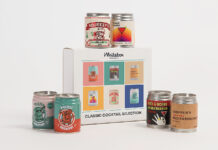It goes without saying, but I’ll say it: Kentucky has been a centuries-long leader in spirits, namely bourbon, boasting distilling families who have been producing whiskeys for generations. Whether the idyllic, historic town of Bardstown or the laid-back city of Lexington, distilleries abound across the state with roots running from decades to a couple centuries back.
I also must state that with such heritage often comes a staid style, expectation, tradition — and sometimes a lack of experimentation or innovation. Whether stately brick buildings housing distilleries in downtown Louisville or traditional labeling, many Kentucky brands stick with a classic format. All of that is fine and good, but one would hope to find the entire gamut in any leading distilling region. In the midst of a global craft distilling renaissance over the past decade plus, Kentucky isn’t exactly where you’d find the cutting edge or boundary pushers. In fact, you’d be hard pressed to move far beyond the dominant spirit: bourbon (with plenty of rye and other whiskeys to boot).
An exception to the rule is boundary-pushing Copper & Kings (https://www.copperandkings.com/), opened by Joe and Lesley Heron in 2014, with its mainstay spirit American brandy. Their bold black and orange distillery design, music-influenced (sonic) aging, solera-style blending and location in Louisville’s hip Butchertown ’hood confirmed that this wasn’t just another Kentucky distillery. Following the decades-old tradition of California brandy, the Herons’ bold brandies were their flagship spirit, alongside absinthe, gin, liqueurs and other spirits they produced (note: no whiskeys).
In January 2018, Constellation Brands purchased a minority stake in Copper & Kings. In September 2020, they purchased Copper & Kings outright, the first full acquisition through their Constellation Ventures brand. Post-sale, the Herons moved to Eastern Kentucky to focus on an off-the-grid cabin and beehives in keeping with their passion for environmental sustainability. What this means for the distillery remains to be seen, but there is no doubt what they kicked off in 2014 has been a welcome change of pace for the Louisville distilling scene — and Kentucky at large.
Rabbit Hole Distillery opened in May 2018 (https://distilling.com/distillermagazine/louisville-2-0), focused, yes, on whiskey, but also gin and vodka. More importantly, their artful, modern, sleek, architecturally forward distillery design felt like another step into diversifying the local “scene.” Just down the street from Copper & Kings, it signified Butchertown as the up-and-coming neighborhood.
Weeks later, Old Forester (www.oldforester.com/distillery) — with roots back to 1870 —opened a downtown Louisville distillery in, you guessed it, a historic, renewed-brick building, installing state of the art distilling equipment and offering regular tours. All examples of how new and old collide in a city with the kind of roots Louisville holds. While Rabbit Hole and Copper & Kings showcased a new style in contrast to the dominant classic Kentucky style, they haven’t exactly started a movement. The old school still dominates and persists. Let’s be clear: It shouldn’t go anywhere. But for the sake of depth, range and diversity, there is room for much more — and the appetite for it, according to key industry locals.
Then enters the pandemic in 2020 to thwart all business. Or did it? Has the tragedy of COVID-19 perhaps ushered in new opportunities for distillers and the drink industry at large? Again, talking to local experts, in Kentucky as everywhere, it’s a mixed bag. As with many states in the US, legislative changes are among some of the most positive moves in the right direction. Though met with some opposition, a larger majority seem to agree on finally abolishing antiquated, onerous and unfairly punitive Prohibition-era laws that penalize distilleries far over the rights already allowed breweries and wineries. Pandemic has also made clear the crucial need for amping up online presence, virtual tastings and direct sales.
Along with distillers around the nation and world, Kentucky distillers produced over 520,000 gallons of hand sanitizer during the state’s shutdown. They’ve also held extensive meetings around forming guidelines for a reopening plan with guidance from an infectious disease expert at the University of Kentucky.
Talking to local industry experts, the nuances unfold. In the midst of what was already changing in the Kentucky distilling and drink industry in recent years, what will things look like after the pandemic? Here are five key areas that continue to change in Kentucky, which in many ways is a microcosm of what is happening nationally and internationally.
More Women, More Diversity, Different Spirits
Samara Rivers, founder of Black Bourbon Society (BBS; www.blackbourbonsociety.com) and founding executive director of Diversity Distilled (www.diversitydistilled.org), launched BBS in 2016 in response to a lack of diversity within the bourbon community. She partnered with major brands, including Four Roses, Woodford Reserve and Maker’s Mark, to host everything from exclusive events and curated whiskey dinners to private whiskey tastings across the US. BBS offers exclusive Kentucky trips and throws Bourbon Boule, an annual bourbon conference in New Orleans for BBS members and followers. As with most events of 2020, they took Bourbon Boule online and virtual in pandemic.
Rivers hosts the Bonded in Bourbon podcast (www.bondedinbourbon.com) with Armond Davis, and was behind the Black Manhattan Project (www.blackmanhattanproject.com), a month-long hashtag campaign in February 2021 to raise awareness around diversity and inclusion within the spirits industry. Besides judging spirits, public speaking, hosting tasting seminars and acting as a diversity and inclusion consultant, she also works with brands on understanding and deepening their relationship with BIPOC consumers through marketing and beyond. Has she seen a change in the industry since launching her businesses?
“The bourbon trend is constantly growing and becoming more inclusive now,” Rivers explains. “You see more African Americans, Asians, women, etc., all eager to learn and engage in the spirit. I think bourbon and bourbon tourism will continue to boom and become one of the highest revenue generators in Louisville. Not only will the continued growth of bourbon-based/themed businesses continue to pop up, but I see the local community getting involved more.”
Considering what might be the most important areas of education and progress still needed for the industry, Rivers says “the education and progress needs to be made within the brands. The work still needs to be done in teaching the brands how to dispel myths and stereotypes among black consumers in a way that isn’t offensive but rather inviting and inclusive in overall marketing efforts and beyond.”
David Dafoe is founder of Flavorman (https://flavorman.com) and Moonshine University (https://moonshineuniversity.com), the latter the exclusive education provider of the Kentucky Distillers’ Association (https://kybourbon.com) and a full-on distilling school. Speaking about the evolution of interests and type of student coming to Moonshine U, he says: “Our first class at Moonshine University was in January 2013 with forty attendees. Since that first class, we have seen the classes trend younger, significantly more females in each class, more attendees from outside the US (47 countries) as well as more people of color. Interest has shifted from mostly whiskeys to other spirits: gin, rum and ready-to-drink cocktails. Further, there is intense interest in knowing the sourced ingredients used to make the finished spirit.”
As the world’s first female master bourbon taster with a long lineage in a whiskey industry family, bourbon is in Peggy Noe Stevens’ blood (https://peggynoestevens.com). Working for major businesses like Brown-Forman and starting Bourbon Women (https://bourbonwomen.org) in 2011, Peggy is a champion for the category and for women in the industry, consulting and coaching. She launched the Womenar Series, covering much-needed deep dives into subjects like “Power is Not a Privilege: 12 Traits of Powerful Women” and “Work-Life Purpose: Balance is a Bust.” She’s also one of merely a handful of women inducted into the Kentucky Bourbon Hall of Fame.
Noe Stevens confirms that even in pandemic, ”I work with a lot of craft distillers and my inquiries have not stopped. Some of them have really unique ideas that go beyond bourbon, including unique finishes or exclusivity bottles that are hand-selected.”
In keeping with her long-held mission to open up doors for women in the industry, she has “definitely” seen an increase in women working in distilling, which she explains, “has caught the eye and the focus of the media. Craft distilleries call me all the time and ask me for women distillers that I can recommend.”
At Home Education and Do-It-Yourself (DIY) Tastings & Pairings
As previously mentioned, another key change nationally has been the at-home education and do-it-yourself factor. Noe Stevens’ book, Which Fork Do I Use With My Bourbon? (which she co-wrote with Susan Reigler on home entertaining and food pairings with bourbon and cocktails), came out in May 2020, as pandemic fully kicked in. Millions turned to home bartending and attempting their own food and drink pairings, making books like this unexpectedly timely and strong sellers.
”Because of virtual,” she posits, ”people want to know how to do things in their own home — from mixology to making their own bars. They want to mimic or carry ideas from the distillery into their own home. [They’re asking questions like] ‘What are your preferred mixers? What kind of cherries are you using?’ Some are even doing their own home spirits blends.”
These trends reflect an ever-broadening American palate, unexpectedly thrust forward in pandemic. Manufacturing one’s own quality experiences and tastings at home became a necessity once restaurants, bars, distilleries and the like were shut or limited to all. And much as the hope is millions will return to and continue to support local food and drink establishments, the argument could be made that America’s general palate and at-home cooking and bartending skills have made a permanent jump forward.
Online Presence
While pandemic has led to all manner of online education opportunities, bartender-led cocktail classes, spirits tastings, virtual judging and the like, it has been a steep learning curve for many, as distillers have had to up their online presence overnight. Noe Stevens sees distilleries changing to adopt a major virtual focus where many had none before: ”Distilleries are learning to be nimble and always have a virtual arm going forward. I think that’s pretty cool.”
Online and direct-to-consumer sales and the reversal of the laws holding that basic right back have become essential. But we’ll get into legislation in a moment. The dramatic change of needing to shift sales focus has slowed down already devastated small businesses.
Losing on-premise restaurant, bar, hotel, etc. accounts has been disastrous for many craft distillers, especially as millions of consumers focused on big, mainstream brands for their few at-home purchases. This is where outdated, useless legislation kills small business when it’s hard enough to drum up consumers that previously had not existed. The fact remains: online sales, virtual classes and tastings, media outreach and other online elements have become a lifeline to spread the word of a brand, gain new customers and start to fill in the massive gap left by on-premise sales.
Noe Stevens’ Bourbon Women recently celebrated its 10-year anniversary. Though she’s had to switch to virtual events, their member numbers have actually increased due to going virtual, opening and broadening the community of bourbon women globally. It is one of the unexpected opportunities — an open door of possibility — in COVID-19 times that has the potential to deeply benefit the industry.
As on-premise slowly starts to pick up again, the pandemic has revealed numerous unstable gaps and shaky ground not only in our industry but in small business in general. The need for one’s own direct-to-consumer base has proven to be absolutely crucial for potentially changing tides in the future. As our beloved restaurants and bars remain vulnerable and subject to shifting winds, so do distilleries and drink businesses. While our industries are privileged to be deeply intertwined, it’s clear a multi-pronged approach and various revenue streams are going to be necessary to stay alive with future ebbs and flows.
Bourbon Dominance
What of Louisville and Kentucky’s bourbon-centric mindset and big business dominance? Moonshine University’s Dafoe says, “Louisville is primarily a bourbon town and has changed very little over the last decade. What has changed is the number of bourbon brands coming from local craft distilleries. We have seen a number of new craft distilleries in and around the downtown area giving tours and tastings with spectacular event space.”
Clearly, bourbon still dominates Kentucky, an industry that has gone well beyond distilleries to bourbon-themed fairs, festivals, hotels, restaurants, bars, concerts, races and tours. “Bourbon has become not just a drink, but a culture, a lifestyle and a main economic and tourism driver,” says Kentucky Distillers’ Association (KDA) president Eric Gregory in a recent press release.
As with tourism everywhere, for the first time in its 21-year history, visitors to Kentucky Bourbon Trail and Kentucky Bourbon Trail Craft Tour distilleries dropped precipitously, per the KDA — especially with over 70% of all visitors coming from outside Kentucky. Some 587,307 tours were taken along “the trail” in 2020, compared to a record 1,719,821 million tours in 2019. At a 66% decrease, this is the first drop in the trail’s 21-year history after experiencing a whopping 315% growth from 2009 through 2019.
Gregory emphasizes, “[2020] was devastating for tourism and experts are skeptical on consumer confidence until 2022 at the soonest. Also, many of the main bourbon tourism drivers —sports, concerts, fairs and festivals, conferences and other events— were canceled.”
Bourbon/whiskey drives much of the state’s economy and tourism so it becomes apparent why there is a big need to support the industry and lift onerous legislation. But it also poses the hope that an even deeper, broader spirits industry in the state will only add layers of interest, online consumers and future tourism.
Long Overdue Legislation Changes
Globally and nationally, the fight for liquor law changes rages on. There are more than 15 states currently working on changing direct-to-consumer laws, much of which dates back to Prohibition and is damaging to small business, often unfairly penalizing craft distilleries over counterparts in wine and beer.
In Kentucky, it has been one exciting year already on the liquor legislation front. These unique-to-Kentucky laws could greatly aid a suffering industry. The KDA’s 42 members are advocating legislation in Kentucky’s General Assembly that would give the necessary tools for long-term survival and future success.
Key laws include:
— HB 415: Thankfully on March 5, it was announced that HB 415 passed the House with an overwhelming 82–15 margin, then the Senate, then was signed by Governor Andy Beshear. Sponsored by Representative Adam Koenig, this crucial bill updates Kentucky’s 2020 direct-to-consumer bill for spirits shipping. HB 415 grants distilleries privileges won by Kentucky microbreweries in 2018, allowing third-party fulfillment centers to process orders, bypassing the three-tier system. It also allows distilleries to collect and remit wholesale and excise taxes on bottles purchased in their visitor centers.
—SB 67: Sponsored by Senator John Schickel, this bill permanently authorizes to-go cocktails. Previously, only restaurants were allowed to offer take-home cocktails, but hospitality and tourism groups advocated for the inclusion of bars, wineries, breweries and distilleries to this bill. After much debate, in March 2021, SB 67 passed the Kentucky Senate and the House. “The cocktail movement has been one of the main drivers behind the bourbon renaissance,” notes KDA’s Gregory. This is a big win for all of the above and trickles down to distilleries.
—SB 108: Sponsored by Senator Paul Hornback, this measure would allow sales of private barrel selection bottles to consumers by restaurants and hotels with a by-the-drink alcohol license, as well as distillery visitor centers, in keeping with what beer, wine and other retail licensees are already allowed to do.
— SB 68: Another law that passed the Senate 32–2 and the House 78–15, SB 68 (also sponsored by Senator Schickel) exempts educational institutions from the state’s 600-gallon production requirement for licensure in each institution’s hands-on distilling courses. “Senator Schickel always takes a leading legislative role on behalf of our homegrown industry as he understands the state’s archaic, Prohibition-era laws are in desperate need of updating to keep up with the bourbon boom and today’s modern, consumer-driven economy,” KDA’s Gregory says.
Despite all these hard-won victories, there are still hurdles to face for Kentucky distilleries, held back with antiquated laws. Though Kentucky produces 95 percent of the world’s bourbon, out of over 3,500 distilleries in all 50 states, Gregory explains that distilling is the highest taxed industry in Kentucky, currently the only place in the world that taxes aging barrels of spirits, an issue that also diminishes jobs investment. “There are a dozen states that now have more distilleries than Kentucky, but none can match our 200-year history and heritage of crafting the world’s finest bourbon.”
While the battles ahead are many, pandemic has been an unexpected aid in pushing forward a number of necessary law changes.
A Post-COVID Renaissance?
Many in the industry have talked about a potential celebratory “Roaring 20s” era coming post-pandemic, as we all experience a new level of appreciation of life, freedom and health, returning to travel, open businesses, events and social interaction.
Richard Wolf, a longtime major player in the bourbon and spirits world, including his years as VP General Manager at Sazerac Co. (Buffalo Trace Distillery), uses a word that hints at something even grander: renaissance.
Wolf runs Wolf Consulting LLC (www.wolfconsults.com), working closely with spirits industry individuals and organizations. As he keeps close tabs on Kentucky laws affecting the industry and post-pandemic realities, Wolf comments on the big drop in distillery visitors along the Kentucky Bourbon Trail, calling it a “sobering reminder of the impact of COVID on the craft distillers in KY, and by extension, all others. Of course, the legislation is intended to provide relief and to help drive a post-COVID renaissance.”
Often what is most idealistic and visionary takes not only grueling work, but daily dedication. It is thanks to the many who have put pressure on the government, the government leaders willing to sponsor necessary bills and the agility of the industry to learn new skills and adjust business models overnight that such a renaissance might be possible.
Coming out of over a decade of explosive distilling growth and interest globally, pandemic has been the biggest and most crippling blow to all business, especially small business. Yet, the resilient, hard-working drink industry is already morphing, fighting, pushing and evolving into a new and coming era that yet remains to be fully seen.
One looks to states like Kentucky, whose distilling industry has already survived centuries of rising and falling, to see what long-term investment and the long game might look like. Together, we hope to all be standing on the precipice of an industry renaissance.

